We provide an Advanced Standing pathway tailored for those holding a Bachelor of Social Work, along with full-time and part-time enrollment options for our 60-Credit Hour program, available to individuals with any bachelor's degree.
Explore diverse clinical social work electives with the option to become a school social worker in Connecticut.
Benefit from unwavering support throughout the program, with personalized field placements aligned with your passions and career aspirations.
Our faculty are licensed clinical social workers nationally and internationally recognized for their significant contributions in the field.
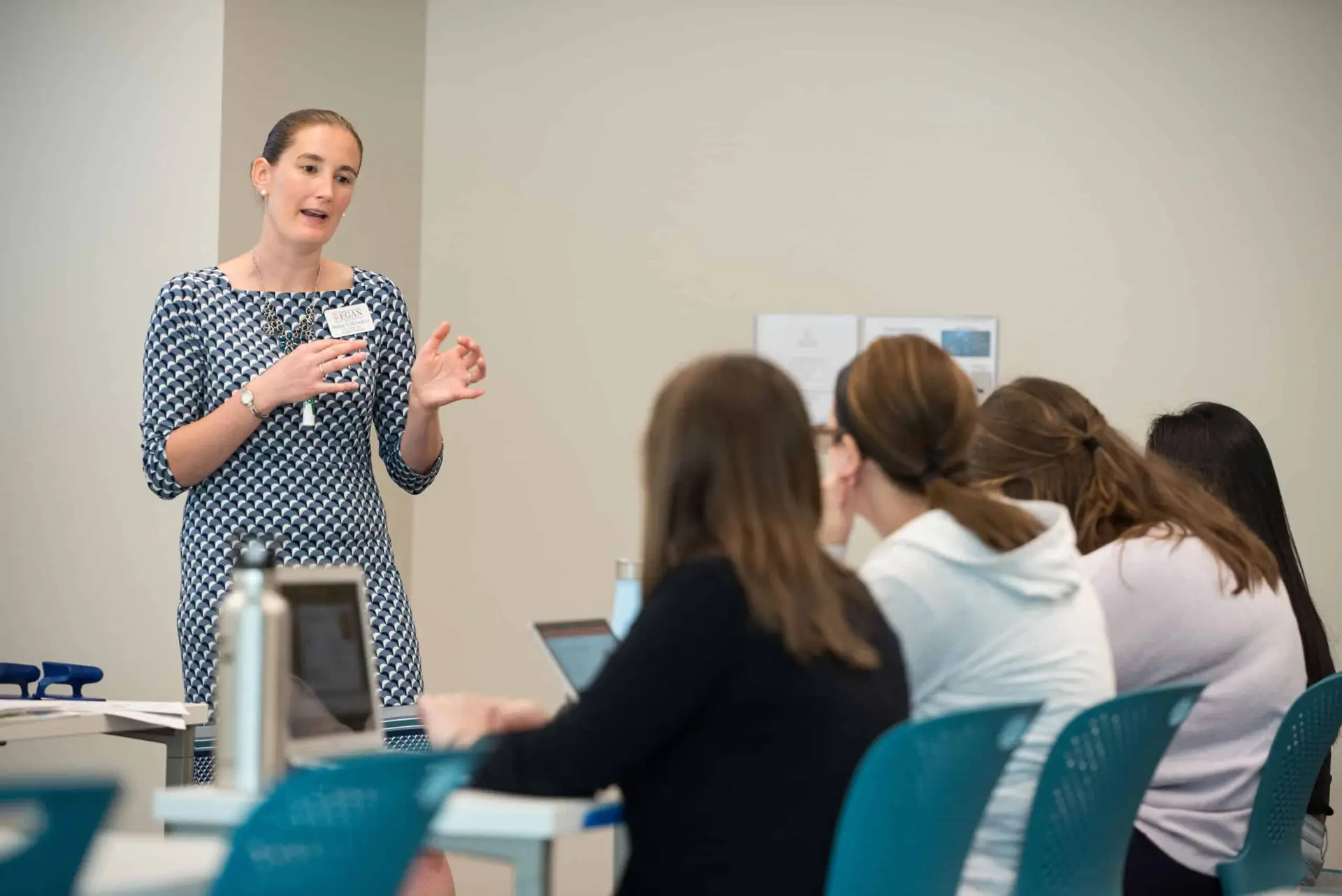
Join us this Tuesday, Jul 22, 2025 04:00 PM MST, for our upcoming information session to learn how Fairfield University’s MSW program can help you advance your career and achieve your goals! You’ll learn more about our low-residency program, the demand of the field, the admissions process, potential job opportunities, and more.
Program Director Suzanne Marmo, LCSW, PhD, will be hosting the webinar and our enrollment coaches will be on hand to answer all of your questions.
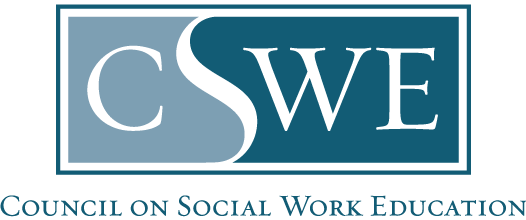
Our social work degree prepares graduates to acknowledge and uphold the worth and dignity of all people, promoting well-being, diversity, and justice for individuals, families, groups, organizations, and communities.
Advanced Standing: $28,200 ($940 per credit hour).
Two-year: $56,400 ($940 per credit hour).
$10,000 Fellowship Scholarship is available through 2025.
Please see the Tuition and Financial Aid page for more information.
The Master of Social Work program is open to students with bachelor’s degrees in any discipline. An undergraduate GPA of 3.0 or better is preferred but not required.
Advanced Standing: The student’s bachelor’s degree must be in social work from a CSWE-accredited institution obtained in the last five years.
No GMAT/GRE required.
It’s easy to apply. Here are the steps:
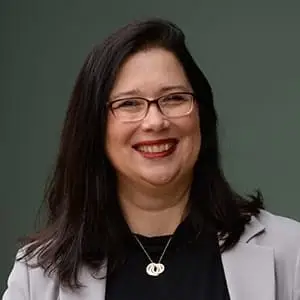
Suzanne Marmo, a licensed clinical social worker since 2001 and Certified Advanced Palliative and Hospice Social Worker (APHSW-C) since 2019, holds a Master’s Degree from The State University of New York at Stony Brook and a PhD from Fordham University. Specializing in grief, bereavement, medical and oncology social work, hospice, and palliative care for older adults, she has received national acclaim for her published research. Awards include two peer-reviewed journal article awards (2019, 2022) and the 2022 Award of Excellence in Policy and Advocacy from the Social Work Hospice and Palliative Care Network. Dr. Marmo, a master trainer for ESPEC, is dedicated to educating social workers in palliative and end-of-life care.
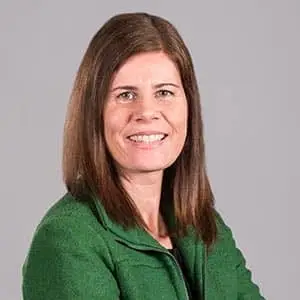
Julie Berrett-Abebe received masters degrees in Social Work and Pastoral Ministry from Boston College in 2004 and a PhD from Simmons University in 2017. Julie's clinical background is in oncology, hospice, and community based care for older adults. Julie's clinical practice has informed her scholarship in health equity, interprofessional education, and collaborative models of practices. She is the PI/PD of a $1.6 million BHWET HRSA Grant (2021-2025), FCHC Scholars (fairfield.edu/fchc-scholars). Julie enjoys teaching across the MSW curriculum.
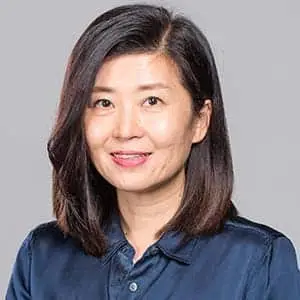
Dr. Yeddi Park, a Ph.D. graduate from the Silver School of Social Work at NYU, brings over 20 years of social work practice, earning her MSW from the University of Michigan in 1999. Her diverse experiences encompass working with refugees, individuals with chronic mental illness, the elderly, and children in public schools. Dr. Park's research focuses on intergenerational issues in immigrant families, health service utilization among immigrants, and adolescent mental health. Actively engaged in community-based research and educational programs, she has contributed significantly in New York and New Jersey.

Jay Taylor, a social worker with a Doctorate from the University of Pennsylvania, specializes in gender transformative interventions, focusing on equity and violence reduction. In Milford, CT, he works in private practice, addressing men's issues, and actively advocates for non-violence and gender equality. As an educator for a decade at Fairfield University, Jay teaches courses in therapy, substance abuse treatment, social justice, and policy. Committed to intersectional social justice, he strives for a liberated world of safety and equity. His work with men promotes healthy masculinity, proven to reduce violence. Outside work, Jay enjoys CrossFit, comic books, movies, live music, and global culinary experiences.
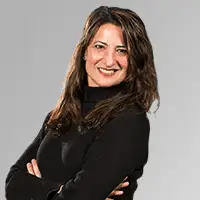
Dawn DeBiase is the Assistant Dean for Graduate Programs at Fairfield University's College of Arts and Sciences and has been integral to the institution's growth. With a BA in Psychology from the College of the Holy Cross and an MSW from Boston College, she brings a rich academic background. Dawn's impact extends beyond administration – she has created and taught courses in Human Behavior, Generalist Social Work Practice, Social Work Fieldwork, and Motivational Interviewing, showcasing her dedication to shaping the next generation of social work professionals.
We offer the flexibility to customize the curriculum to meet your unique professional goals and expand your career choices. Our clinical-focused curriculum, extensive field experiences, and concentration options empower you to choose your path and receive unrivaled support to make a difference in people’s lives.
At Fairfield University, our online Master of Social Work program features courses designed to build both foundational and advanced skills in social work practice. Through a mix of theory, fieldwork, and research-based learning, students engage with topics such as social justice, human behavior, and clinical interventions in diverse settings. Our online MSW program prepares students for a broad range of career opportunities in clinical and community settings.
By earning your MSW degree online with us, you gain the flexibility to advance your education on your schedule, while still engaging in meaningful, hands-on experiences. Our Master of Social Work online curriculum supports professional growth and equips graduates to serve individuals, families, and communities with confidence and compassion.
Credits – 3
Students will examine issues in professional practice with individuals, couples and families from diverse ethnic, cultural, racial, religious, and socioeconomic backgrounds. Students increase their self-awareness of their own social identity, values and biases, and impacts on their clinical (other professional) work. Collaboration and interdisciplinary contextual factors will be considered. The course addresses the role of power, privilege, and oppression in the lives of individuals, families, and the society. The course addresses the issues of gender role stereotyping and changing sex roles, and integrates professional contributions from the professional literature. Crosslisted with MFTH 5433. Previously SK 0433.
Credits – 3
This course explores the processes of individual and family development from childhood through old age. Presenting theoretical perspectives for studying child, adolescent, adult, and family development, the course examines the modification of family structures over time and psychosocial development within family systems and cultural contexts. Crosslisted with COUN 5447, MFTH 5447. Previously SK 0447.
Credits – 3
This course is designed to introduce social work students to various theoretical models that explain how human behavior is shaped by groups, organizations, and communities. The ecological and strength perspectives are employed for understanding human behavior within the context of these systems. Attention is also placed on the influence of social class and ethnicity on human behavior. This course will look at the different worldviews of diverse populations in order to help students develop and achieve cultural competencies. Previously SK 0533.
Credits – 3
Social work practice is based on a foundation of generalist social work. This course begins with an overview of the profession through its history and conceptual development and an examination of fundamental social work knowledge, values, and skills. The content focuses on social work interventions appropriate at the macro environment, mezzo and micro levels of practice. All aspects of practice will be presented in the context of cultural competence and social justice. Previously SK 0550.
Credits – 3
This course surveys the history of social welfare policy, services, and the social work profession. It explores current social welfare issues in the context of their history and the underlying rationale and values that support different approaches. Emphasis is placed on major fields of social work service such as: income maintenance, health care, mental health, child welfare, corrections, and services to the elderly. Analytic frameworks with regard to social welfare policies and services are presented. These frameworks identify strengths and weaknesses in the current social welfare system with respect to multiculturalism and diversity; social justice and social change; behavioral and social science theory and research; and social work relevant promotion, prevention, treatment, and rehabilitation programs and services. Previously SK 0552.
Credits – 3
This course offers field practice and immersion into social work process under direct supervision of an LCSW social worker. The field placement engages the student in social work practice, integrates policy formulation into a coherent professional position, and builds an understanding of social justice as integral to the profession. The field placement (and accompanying integrative seminar) is designed to support students in developing and integrating skills and knowledge learned in coursework into their professional social work practice. Fieldwork I and II require a student to spend a minimum of 450 hours in a supervised field setting. Each student is expected to assess her/his social work learning needs, and to plan and complete, with the assistance of the agency-based field instructor, activities that support achievement of structured learning goals. Student progress is monitored throughout the placement using a competency development model. Two formal student evaluations are completed: at mid-placement and at the end of the field placement. All social work fieldwork requires participation in integrative practice seminars throughout the semester. Students must complete 450 hours in generalist social work practice field placement prior to enrollment in this course. Previously SK 0559.
Credits – 3
This required course is part of the research sequence in the generalist practice curriculum. The purpose of this course is to develop students’ understanding and skills in the approaches, techniques, and challenges of conducting social work research and to enable students to be competent and discerning consumers of social science literature. Previously SK 0566.
Credits – 3
Prerequisite: SWRG 5551.
Social work practice is based on a foundation of generalist social work. This course begins with an overview of the profession through its history and conceptual development and an examination of fundamental social work knowledge, values, and skills. The content focuses on social work interventions appropriate at the macro environment, mezzo and micro levels of practice. All aspects of practice will be presented in the context of cultural competence and social justice. Previously SK 0551.
Credits – 3
Prerequisite: SWRG 5561.
This course offers field practice and immersion into social work process under direct supervision of a Licensed Clinical Social Worker. The field placement engages the student in social work practice, integrates policy formulation into a coherent professional position, and builds an understanding of social justice as integral to the profession. The field placement (and accompanying integrative seminar) is designed to support students in developing and integrating skills and knowledge learned in coursework into their professional social work practice. Fieldwork I and II require a student to spend a minimum of 450 hours in a supervised field setting. Each student is expected to assess their social work learning needs, and to plan and complete, with the assistance of the agency-based field instructor, activities that support achievement of structured learning goals. Student progress is monitored throughout the placement using a competency development model. Two formal student evaluations are completed, at mid-placement and at the end of the field placement. All social work fieldwork requires participation in integrative practice seminars throughout the semester. Previously SK 0560.
Credits – 3
Prerequisite: SWRG 5433, SWRG 5447, SWRG 5533, SWRG 5553, SWRG 5566, SWRG 6552, SWRG 6562.
Motivational Interviewing (MI) is “a collaborative conversation style for strengthening a person’s own motivation and commitment to change” (Miller and Rollnick, 2012). The definition has intentionally evolved throughout the “lifespan” of this counseling posture (since its inception in the 1980s) to reflect its applicability and effectiveness not only across clinical populations, but also indeed among non-clinical populations. This first required course (of a two course sequence in MI) offers both theoretical foundations and critical skill acquisition for “beginner” competency. Methods of instruction will include didactic modules, written exercises, small-group exercises, video analyses, and many opportunities to practice key skills. Previously SK 0562.
Credits – 3
This is a clinical skills and practice course, taken during students’ final semester in the MSW program. The course is designed to introduce students to a range of therapeutic modalities, including: psychodynamic therapy, cognitive therapy, and family therapy. Students will hone skills in case formulation from multiple theoretical perspectives and application of theory to practice, using above modalities. The final capstone presentation will give students the opportunity to demonstrate knowledge attained throughout the program (across core competencies – ethics, social justice, policy, process of clinical practice) in the format of a case presentation. Students will also share a professional identity statement. 3 credits
Credits – 3
Prerequisites: SWRG 5433, SWRG 5447, SWRG 5533, SWRG 5553, SWRG 5566, SWRG 6552, SWRG 6562.
Students will develop knowledge of evidence-based practice, including skills needed to identify, acquire, and assess appropriate interventions for practice and basic skills required to evaluate their own social work clinical practice. Previously SK 0568.
Credits – 3
Prerequisites: SWRG 5433, SWRG 5447, SWRG 5533, SWRG 5553, SWRG 5566, SWRG 6552, SWRG 6562.
This advanced social work course addresses clinical diagnosis and assessment in the treatment process. Diagnosis and assessment represent the integration of information from multiple sources to provide a perspective of current individual, partner, and family functioning for the purpose of decision-making, treatment planning, evaluation, and interdisciplinary and larger system communication. This course will highlight an awareness of gender and diversity issues in diagnosis and the ethical use of formal and informal assessments. It will provide an introduction to the nomenclature and decision-making procedures of the DSM-5, and an overview of standardized assessment instruments and self-report inventories available for use with individuals, couples, and families. Previously SK 0569.
Credits – 3
Prerequisite: SWRG 6569.
This course provides an integrative framework for assessment and diagnosis in clinical practice with adults. The process of assessment is situated in the context of clinical practice, including: collaborative treatment planning, interventions, evaluation, and interdisciplinary and larger system communication. This course will highlight an awareness of anti-oppressive practice in diagnosis and the ethical use of formal and informal assessments. It will provide an introduction to the nomenclature and decision-making procedures of the DMS 5, and an overview of standardized assessment instruments and self-report inventories available for use with adults.
Credits – 3
Prerequisites: SWRG 5433, SWRG 5447, SWRG 5533, SWRG 5553, SWRG 5566, SWRG 6552, SWRG 6562.
This course will focus on the key theories that explain the impact of the environment on human experience to be followed by an examination of how dimensions of culture, power, oppression, and cultural contexts can shape individual values, beliefs, worldviews, and identities and therefore play a role in the helping process. The course will build on Social Justice and Diversity in Professional Practice and will continue to explore areas of universality and difference in the context of gender, race, ethnicity, sexual orientation, spiritual beliefs, and socioeconomic status, as well as the realities and influence of multiple forms of oppression. Empathic and skillful clinical interventions with individuals, groups, and communities require self-understanding as well as understanding of others. This course provides an opportunity for increased self-awareness. The goal of the course is to enable students to develop a culturally competent framework for analyzing human behavior in order to create empathic, empowering relationships with individuals, families, groups, organizations, and communities. The course will also explore ethical decision-making theories and processes. Ethical decision-making is informed by knowledge of legal statutes and the NASW Code of Ethics. Exploration of interdisciplinary collegiality, ethical codes, and professional identity will also be discussed. Previously SK 0577.
Credits – 3
Prerequisites: SWRG 5433, SWRG 5447, SWRG 5533, SWRG 5553, SWRG 5566, SWRG 6552, SWRG 6562.
In Advanced Clinical Field Work, students are placed in clinical settings where they provide therapy to individuals, couples, families and groups. Students will apply clinical models and interventions in their work with clients across the lifespan. All social work fieldwork requires participation in integrative practice seminars throughout the semester. Previously SK 0580.
Credits – 3
Prerequisite: SWRG 6581.
This course is a continuation of SWRG 6581. Previously SK 0581.
Credits – 0
This zero-credit course is designed for students as a mechanism for payment of SWRG Technology Fee associated with the Tevera site placement platform used for the clinical training process.
Credits – 6
Credits – 3
This class is designed to expand candidates’ multicultural competence when working with sexual and gender minority (SGM) individuals, couples, and families in educational, mental health, and healthcare settings. This course adopts an intersectional, critical, and social justice perspective by interrogating heterosexism, homophobia, transphobia, power, privilege, and oppression. Using the minority stress model, candidates will examine health disparities and critical presenting concerns, such as coming out, depression, suicide, and gender transition. Candidates will engage in critical self-reflection of their own multicultural identities and the influence of these on the therapeutic process or the educational setting. Previously FT 0470.
Credits – 1.5
Prerequisite: MFTH 5470.
This course is designed to expand candidates’ understanding of transgender and gender expansive youth, adults, and their families in educational, mental health, and healthcare settings. This course adopts an intersectional, relational, and family life cycle perspective. Topics include the unique challenges faced by transgender and gender expansive individuals, couples, and families, gender identity development, and letters of support for medical gender transition. Candidates will integrate professional practice standards, research evidence, and critical reflection of their own social identities to articulate an affirmative approach to treating transgender and gender expansive individuals and their families.
Credits – 1.5
Prerequisite: MFTH 5470.
This course is designed to expand candidates’ understanding of queer and trans youth, their families, and their communities through a critical, intersection, and queer lens. In particular, we will consider the implications for family work with young people whose identities are relationally and discursively constructed and situated. Candidates will focus on cultivating a praxis of self-reflexivity and accountability for power relations. Candidates will integrate queer theory, research evidence, and critical reflection of their own multicultural identities to articulate an affirmative approach to treating sexual minority youth and their families.
Credits – 3
Prerequisite: MFTH TBD.
In this course, candidates apply the knowledge and skills gained throughout the certificate program to create and implement a project in their place of employment, other sponsoring organization, or community. The project is developed with a faculty mentor and community partner to directly impact the mental health of SGM individuals, couples, or families. Candidates take this course after completing all other coursework required for the Certificate in Sexual and Gender Minority Mental Health. Previously FT 0499.
Ready to get started on your online Master of Social Work? Learn how to apply today and discover why you should choose Fairfield!